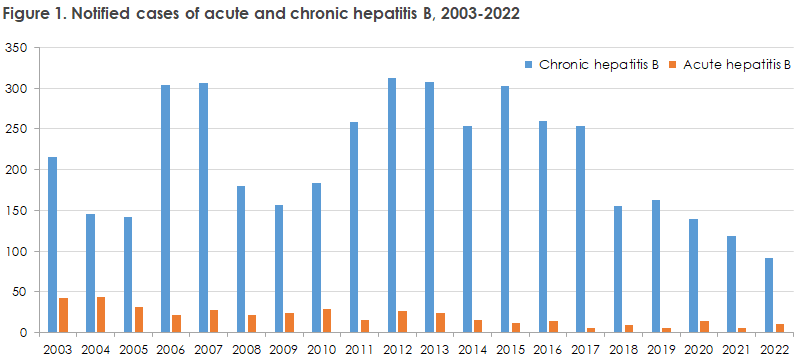No 49a - 2023
Acute and chronic hepatitis B 2022
Acute and chronic hepatitis B 2022
For a detailed description of the epidemiological situation, please see the Annual Report on Acute and Chronic Hepatitis B 2022.
Acute hepatitis B
In 2022, the Department of Infectious Epidemiology and Prevention received ten notifications of individuals with acute hepatitis B.
The number of notified cases of acute hepatitis B remains low, although there were more acutely infected individuals in 2022 than in 2021, Figure 1. The majority of acute cases in 2022 were infected sexually in Denmark. Similar to 2020 and 2021, there were also reported cases of acute hepatitis B in 2022 where the infection occurred through intravenous drug use. Routine testing of intravenous drug users remains crucial to be able to offer vaccination, control and treatment of hepatitis B in this group. In the Danish Health Authority’s guideline on HIV and hepatitis B and C, you will find more information about recommendations for vaccination and testing, along with a list presenting the risk groups offered a free vaccination schedule in Denmark.
In 2022, the median age was 42 years (range 21-73 years).

Chronic hepatitis B
The Department of Infectious Epidemiology and Prevention received 92 notifications of individuals with chronic hepatitis B in 2022. The number of individuals notified with chronic hepatitis B continued to decline in 2022, as shown in Figure 1.
Most cases of chronic hepatitis B in 2022 were reported among immigrants infected prior to their arrival in Denmark, with the majority of these cases reported as mother-to-child transmission.
Perinatal transmission was reported as the mode of transmission for five adult Danish-born individuals, all born to mothers with a non-Danish origin, and all five were born before the introduction of general screening of pregnant women for hepatitis B in 2005.
In 2022, 61 of those notified (66%) were women. The median age for women was 35 years (range: 2-63 years); for men, it was 43 years (range 24-78 years).
Half of the women notified with chronic hepatitis B were identified through the general screening of pregnant women. No children were notified as infected at birth in Denmark in 2022.
It is important for general practitioners not to opt-out of screening for hepatitis B in women already known to have hepatitis B. By screening this group as well, it ensures that the woman is monitored at a specialized department for control and possible treatment, and that the child receives immunoglobulin and a vaccine at birth, along with the remaining vaccines in the schedule. See vaccination of children born by women with chronic hepatitis B infection. The importance of pregnancy screening is also underpinned by the fact that Denmark is one of the few countries globally where hepatitis B is not a part of the childhood vaccination program.
(L. H. Holm, M. Wessman, Department of Infectious Disease Epidemiology and Prevention)
6 December 2023